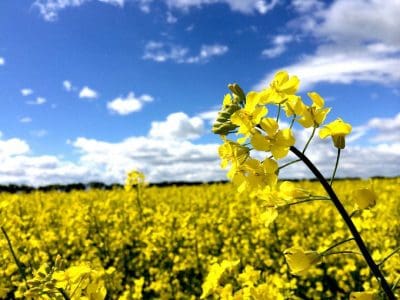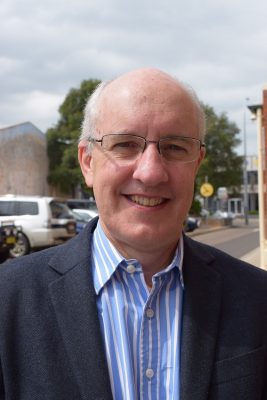
South Australian farmers will be able to grow varieties like Nuseed’s Roundup Ready GT-53 from 2020 if the state’s parliament votes as expected to end the state’s GM ban. Photo: Nuseed Australia
YESTERDAY’S announcement by the South Australian Government looks likely to spell the end to the state’s moratorium on genetically modified (GM) crops, with the introduction of herbicide-tolerant canola varieties to its crop rotations expected to be the biggest broadacre change.
The news has brought mostly positive responses from grower and industry organisations, and has left the island state of Tasmania as the only Australian jurisdiction with a ban on GM crops.
However, the SA announcement has drawn criticism from Gene Ethics, which says the move has reneged on the state’s pledge to keep SA GM-free until 2025.
Benefit for WA
Australian Oilseeds Federation (AOF) executive officer Nick Goddard said the repeal of the moratorium would provide freedom of choice for SA canola growers to adopt the farming practices that best suited their needs, as can growers in New South Wales, Queensland, Victoria and Western Australia.
Mr Goddard said it would also enable canola grown in SA to compete with seed grown in Canada on the world market, and would also be advantageous for WA growers.

Nick Goddard
“WA growers also stand to benefit from the repeal as they will be able to receive canola planting seed much faster from NSW and Victorian-based seed suppliers who have to date been prohibited from transhipping their seed through South Australia.
“By shipping direct to Perth by road, and avoiding the convoluted route via the Northern Territory, WA canola growers will have a more responsive and faster supply chain, enabling them to make more timely planting decisions in the lead up to autumn planting.”
Mr Goddard said the SA development was a “well-intentioned and sound move” by the SA Government to consider and act upon the recommendations of the independent review undertaken by Emeritus Professor Kym Anderson.
“The AOF also recognises the unique characteristics of canola production on Kangaroo Island, and acknowledges that some growers are able leverage the KI provenance credentials to their advantage.”
Tasmanian ban stands
The Tasmanian Farmers and Graziers Association (TFGA) earlier this month welcomed the Tasmanian Government’s announcement that the island state’s GM moratorium was being extended by another 10 years.
TFGA CEO Peter Skillern said many international markets such as the European Union demanded GM-free products, and said the Tasmanian Government was to be commended for providing surety to the sector, and recognising the benefits in maintaining the moratorium.
“Tasmania is well placed to enhance and expand our footprint in these large lucrative markets with this announcement,” Mr Skillern said.
The continuing moratorium will allow Tasmanian seed companies to keep producing non-GM seed for resale on the mainland, as well as in Tasmania, New Zealand and some other destinations, and for its growers to supply end-users who demand non-GM seed.
Thumbs up from GPA
Grain Producers Australia chairman Andrew Weidemann said the SA decision would allow producers in South Australia an opportunity to be more competitive in domestic and international markets.
“Congratulations to Grain Producers SA (GPSA), which has been long advocating for a change in how GM is managed in their state,” Mr Weidemann said.
GPA has supported GPSA’s stance to harmonise national regulation of GM crops to strengthen science-based regulation and provide certainty for research-and-development investment in new technologies.
GPA has supported a consistent regulatory approach to GM crop production throughout Australia, which sends a clear message that Australian grain producers have the capacity to manage different crop varieties, regardless of the plant-breeding technique used to develop them.
“GPA believes the removal of the SA moratorium will now drive increased investment into crop breeding technologies in Australia.”
Criticism from Gene Ethics
Gene Ethics director Bob Phelps said South Australia’s ban on commercial GM canola until 2025 had broad public and farmer support, and should remain in place.
“The SA government’s plan to end the GM ban by amending regulations would betray the parliament and the people of the state,” Mr Phelps said.
“The present Select Committee Inquiry into SA (being) GM-free should be allowed to run its course and report to the parliament before any proposed changes are made to the moratorium.”
“We call on the parliament to stand by its moratorium on Roundup-tolerant GM canola.”

Bob Phelps
“The winners from lifting the GM-free ban would be foreign seed and agrichemical companies, and the losers South Australia’s farmers and shoppers.”
Mr Phelps said the proposal that Kangaroo Island could keep its GM-free status and associated premiums for crops it grow was “clear proof of tangible GM-free benefits.”
“Exempting an island from GM canola so it can reap the benefits of GM-free cropping also confirms that GM poses contamination threats to neighbours and supply chains.”
“That’s why Tasmania’s Liberal Government announced last week that their island will remain GM-free till 2029.”
Mr Phelps said farmers who chose to grow Roundup-tolerant GM canola would pay more for seed, segregation and shipping their product, and would receive a discounted price.
“The discount for GM canola versus GM-free varieties in WA last week was $105 per tonne, and GM-free premiums of up to $50/t are also paid in Victoria and NSW.”
Mr Phelps said canola formed just two per cent of all revenue from SA’s broadacre crops, and said profits claimed for growing GM were “grossly inflated”.
“The State Government should stay GM-free and get behind farmers and food businesses to earn substantial GM-free premiums in Australian and overseas markets.”
He said Gene Ethics encouraged all South Australians to say “no” to GM canola during the Minister’s consultation period, and back the parliament’s decision to stay GM-free until 2025.
Viterra ready
South Australia’s biggest bulk handler by far is Viterra, and it has advised it would work closely with grower customers and industry stakeholders to understand their needs in light of the expected lifting of the GM ban.
“Our network is designed for, and has a proven track record of receiving and storing various commodities and grades in discrete segregations,” a Viterra spokesperson said.
“Last harvest we provided 69 different segregations, which are based on commodity, variety and quality specifications.
“Our current handling and quality-management expertise and processes are evidence that we are well-positioned to meet the market requirements of handling and segregating both GM and non-GM commodities.”
Corporates pleased
CropLife Australia represents Australia’s plant-science industry, including herbicide companies, and its CEO Matthew Cossey has called the SA move a win for farmers and the environment.
“We now call on all parties to support this science-based decision so farmers in South Australia can access the clear environmental, agronomic and financial benefits of growing approved GM crops,” Mr Cossey said.
He said adoption of GM crops had already saved 183 million hectares of land globally from cultivation, and responsible for savings in carbon-dioxide emissions of 27 billion kilograms, or the equivalent of removing 90 per cent of passenger cars registered in Australia from the road for one year.
“South Australians can be assured that lifting the GM moratorium will not impact current agricultural commodity price premiums, nor will it impact any other farmers who choose to continue with conventional or organic crops.
“The proposed removal of the moratorium does not alter the strict licensing and accreditation rules surrounding the use of GM crops.
“Across Australia and the world, farmers have been growing GM and non-GM crops side-by-side successfully and productively for many years without creating marketing issues with segregation managed by the bulk grain handlers.”
Research fillip
University of Adelaide ARC Future Fellow Matthew Tucker said lifting the moratorium would provide a much-needed boost to SA growers, researchers and agriculture-related industries.
“It will provide growers with access to technologies that have been available interstate and internationally for over 10 years.
“SA growers will be able to use GM technology as part of a broad toolkit.
It’s a bit like a workshop or kitchen where you need multiple tools or utensils; you don’t use the same tool all the time, but when you need access to it then it’s available.
Assoc Prof Tucker said the benefits of this technology would be seen in countering the effects of climate change and delivering a superior, sustainable and healthier product for consumers.
“It will also stimulate further research and investment in the GM space for our universities, providing opportunities for new jobs and new discoveries.
“Until now, testing GM crops that might benefit SA growers has been carried out interstate.
“Lifting the moratorium will provide an opportunity to safely test and develop new crop varieties in SA under local conditions, also ensuring the economic benefits remain in our state.”
Source: AOF, Australian Science Media Centre, CropLife Australia, GPA, TFGA, Viterra

HAVE YOUR SAY